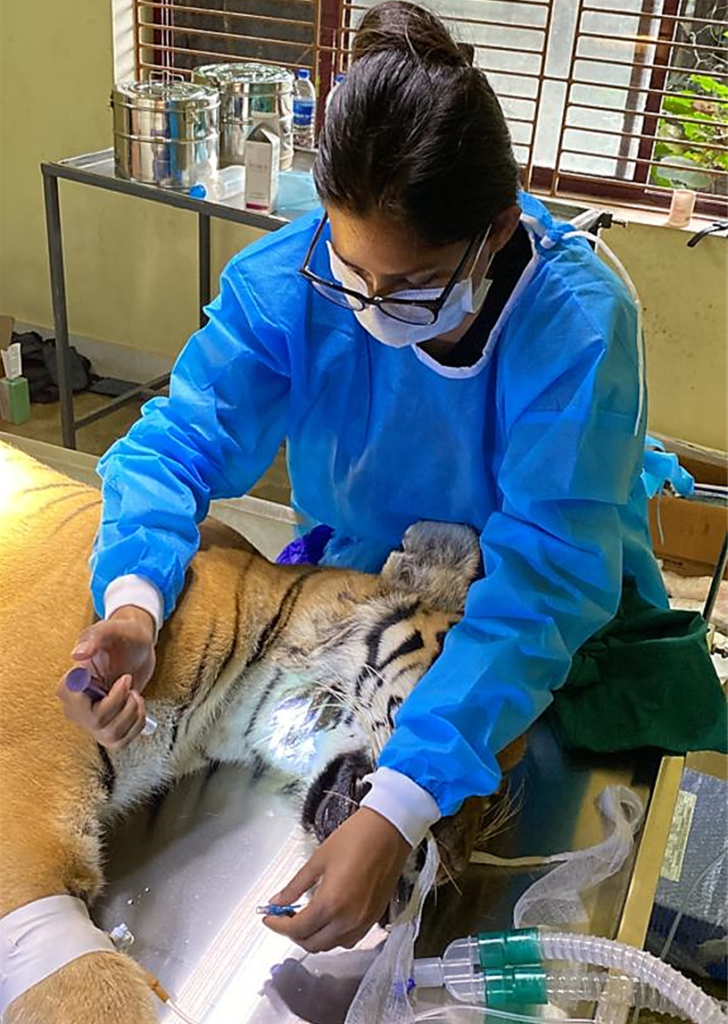
Green Minute News:
A passionate, dedicated wildlife vet, Dr Meghana Pemmaiah made news headlines when she accompanied a caged but sedated leopard during rescue from an open well. With leopard falls in open wells becoming frequent nowadays, rescue operations were taken up by Karnataka Forest department assisted by Chitte Pilli near Mangaluru, Karnataka, India wherein a young female leopard was darted as per protocol, lifted in a cage from 25 feet deep well, treated for dehydration and finally released back into the wild.

For Dr Meghana, this is nothing new as she has been involved in wildlife rescue operations in the last six years in Karnataka. Every year, she does almost 10 darting procedures following all the required scientific protocols.
She adds, “The challenges for darting wildlife in an urban or a rural milieu are many. If it is a leopard, it is challenging depending on the situation but when it comes to the Indian gaur, it is very challenging. For a gaur which weighs half a ton, lot more planning is needed as anesthesia works very differently.”

For the recent leopard rescue case at Mangaluru, Dr Meghana says, “I had absolutely no information about the leopard as it was not at all visible from the top. Till I got down the well, I did not know about its weight, size, health, and other parameters for darting it. So, I carried about 3-4 syringes containing different dosages of the anesthesia for varying body weights.”
“Once I saw the animal which was sitting and growling at the perfect spot for me, I did a mental assessment of the leopardess – about its likely weight/size and health and then only darted it with the right amount of dosage. She was facing me and was quite alert and not in a bad condition at all for darting.”

Within 10-15 minutes, the 25 kg leopardess which was in a good health condition, was sedated.
Then the leopard was carefully pulled to the cage by Dr Meghana and another youngster who went down the well to assist her.
Afterwards, both the leopard and the vet were lifted out of the well carefully.

The leopard was examined for any injuries and treated. Except for slight dehydration, the leopard was completely fine and she was later released into the wild.

There have been many cases of wildlife rescues that Dr Meghana has been involved, however, she expresses her dismay and concern when it comes to incidents of deaths of wildlife in snare traps.
“I have seen quite a few deaths of wildlife wherein they have been inadvertently caught in snare traps that is used for catching wild boars.”

Leopards are the worst hit as they are caught very badly when it is a question of their legs – there is a high chance of fractures, serious injuries when they try to loosen their legs but in fact, it tightens further. Neck region means, snaring will kill the leopard, 95 %, they do not survive while abdominal region results in crushing internal organs.
She adds, “We do not know how badly they are injured. It is highly distressing when big cats are caught in snare traps.”

Apart from this, Dr Meghana has dealt with many cases of electrocution of birds, monkeys, reptiles, and other species and these are very common in urban areas.
Incidents of treatment and release of various bird species like owls, pariah kites, crows, pigeons, etc have been often for this young and dedicated wildlife veterinarian.

After completing her PUC from Christ College, Dr Meghana did her BVSc followed by MVSc in Wildlife and Surgery from Veterinary College, Bengaluru. The next four years, she worked in People for Animals (PFA) as a senior veterinarian in an urban wildlife setup.
Dr Meghana informs that most of her learning experience and exposure to different kinds of cases was at PFA and she had great mentors.
After her marriage to Dr Yashaswi Naravi, she shifted to Mangaluru and has been working along with him at Chitte Pilli – a Wildlife Rescue & Research Centre for the last two years.

Enjoying her work as a wildlife vet for the last six years, Dr Meghana demonstrates her passion for wildlife conservation and calls upon people not to kill wildlife especially snakes out of fear when it enters their home or surroundings. People should immediately inform the forest department or wildlife rescuers or concerned organizations and save our wildlife, she signs off.
